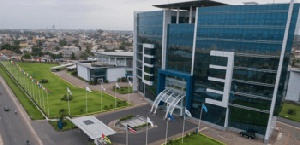Business News of Thursday, 3 April 2025
Source: www.ghanawebbers.com
Multinational African Enterprises
Ecobank has several principal shareholders. They include Nedbank (21.2%), Qatar National Bank (20.1%), and Arise B.V (14.1%). Other shareholders are the Public Investment Corporation (PIC) at 13.5%, Ghana's SSNIT at 3.86%, and Alain Francis Nkontchou at 1.06%.
Ecobank was founded in 1985 to meet financial needs in West Africa. It serves both Anglophone and Francophone markets. The initiative came from the Federation of West African Chambers of Commerce & Industry (FEWACCI). This regional body promotes economic cooperation and development.
The founders included Gervais Koffi Djondo from Togo and Adeyemi Lawson from Nigeria. Their goal was to enhance trade and economic development in the region. This vision began at a meeting in Mali in 1972, where they discussed creating a private banking institution.
In October 1985, Ecobank Transnational Incorporated (ETI) was established with $100 million authorized capital. Initial paid-up capital was $32 million from over 1,500 investors across West Africa. The ECOWAS Fund for Compensation and Development became its largest shareholder, highlighting its regional focus.
The Togolese government granted ETI international organization status, allowing it to operate as a non-resident financial institution with special privileges. Founders Djondo, Lawson, and Philip Asiodu aimed to create an indigenous African bank that would serve the continent.
They brought Arnold Ekpe on board to help establish a strong presence in Nigeria and Ivory Coast. Throughout the late 1980s and early 1990s, Ecobank expanded its network significantly.
In 2005, Djondo launched Asky Airlines as a multinational African airline based in Togo. He served as president of the airline after it was established during an ECOWAS conference in Niger on January 10, 2004.
The following year, Ethiopian Airlines became a strategic partner for Asky Airlines under a management contract for five years. Asky Airlines adopted practices from Ethiopian Airlines, which has been operational since 1945.
MTN Group Limited is another major player in Africa's telecommunications sector. It is based in South Africa with a market capitalization of $12.9 billion. MTN operates in over 20 countries including Syria and generates one-third of its revenue from Nigeria.
With around 288 million mobile subscribers globally, MTN ranks as the world's tenth-largest mobile network operator by subscriber base. The company is listed on stock exchanges in South Africa, Nigeria, Ghana, Rwanda, and the UK.
After Nelson Mandela became South Africa's first democratically-elected president in 1994, he made his first call on MTN’s network—marking a significant milestone for the company.
In subsequent years, MTN underwent leadership changes including replacing CEO John Beck with Robert Chaphe in 1995. In 2001 Johnnic Holdings became its controlling shareholder with Irene Charnley as chairperson.
By 2002 Phuthuma Nhleko took over as Chief Executive Officer after Paul Edwards stepped down following expansion into Nigeria.
Some African enterprises have grown through mergers rather than organic growth alone. For example, Wasoko of Kenya merged with Egypt’s MaxAB to form Africa's largest tech enterprise focused on e-commerce solutions for small retailers across multiple countries.
This merger created an extensive Business-to-Business platform serving Kenya, Tanzania, Egypt, and Morocco while integrating sixteen subsidiaries across Africa.
Investors like Silver Lake and Tiger Global contributed over $240 million before this merger occurred.
The new venture now supports approximately 450,000 merchants serving over sixty-five million customers with more than four thousand employees combined.
In another significant move within the banking sector,
Tony Elumelu led Heirs Holdings' acquisition of Standard Trust Bank by United Bank for Africa (UBA) in 2005.
This merger marked one of Sub-Saharan Africa's largest banking deals.
UBA aims to expand further throughout Africa by establishing branches even outside the continent by late 2025.
Africa continues attracting substantial investments due to its growing wealth among citizens and businesses seeking returns on investment opportunities.
McKinsey executives recently noted that Africa's potential lies not just in rising but also leveraging inherent strengths like its young population and fast-growing cities.











